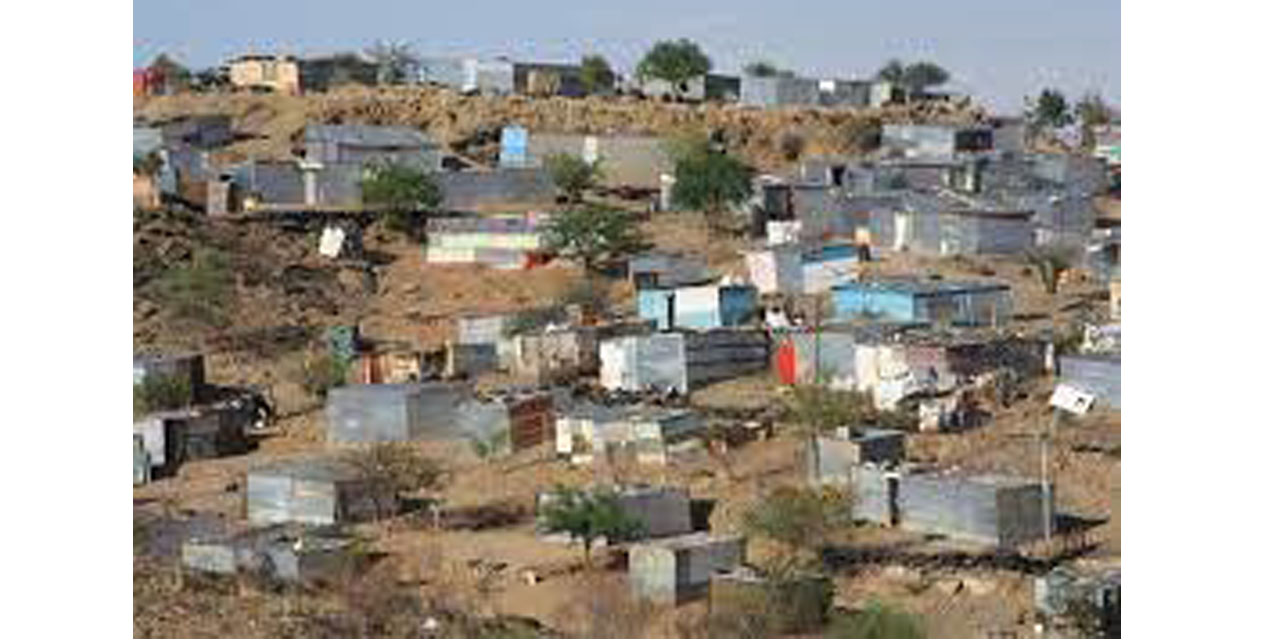Stefanus Nashama
Residents of informal settlements in Windhoek are appealing to the Government for what they say is a mess they find themselves in. They have cited unhygienic environments, a lack of sufficient water and electricity as the main concern for communities.
A number of community leaders who spoke to the Windhoek Observer expressed that people walk long distances to fetch water, risking their lives. They also expressed concern over the rising cases of shack fires, leaving many families homeless.
Silas Shipindo, a community leader in Goreangab said it is not a secret that people in the informal settlements are living an abnormal life and are under valued.
“The only time we are valued and considered relevant is during political campaigns and elections. I have raised my concerns and challenges to the relevant offices, but nothing has been done,” Shipindo said.
The City of Windhoek Mayor, Joseph Uapingene, yesterday said that the municipality faces a number of challenges, including budget constraints. This, in turn, hampers the development and service delivery in informal settlements.
“If we have enough budget, we can obviously deliver and make progress on service delivery and address issues affecting those residents,” Uapingene stated.
He indicated that the Council is busy looking at next year’s budget.
“If we get it right the City will address the issues. I am appealing to Non-Governmental Organisations to come on board and work together with the Council to address the issues affecting the City’s residents, especially those living in informal settlements,”Uapingene added.
He has since called on calm and patience while the Council is working on a budget.
Shipindo on the other hand indicated that contrary to government’s belief that people choose to live and squat in shacks, they do not choose to live in shacks.
“People live there because they have no choice. What should we do? We cannot afford to buy houses like them, and we do not want to sleep under the bridges or at their houses,” he reiterated.
Shipindo stated that people wait for nighttime to relieve themselves in riverbeds when nature calls.
He added, “Some people use plastic bags or containers, and throw them away at night because they have no toilets.”
Mateus Iimbili another resident in the informal settlements described this as “a mess, sickness and a heartless situation that seeks serious attention from top officials”.
Iimbili however said that members of the public should carefully use the services brought to them by the Government.
He explained that some residents misuse public services, damage properties, and remain with nothing, especially those who send children to water points.
A report by the Shack Dwellers Federation of Namibia (SDFN) found that up to 25 percent of Namibia’s 2 million population lives in informal settlements, a significant challenge facing urban development.
The report also suggests that 33 percent of households profiled use open-air toilets, which are harmful and smelly to oxygen, while half of the informal settlements have no toilets at all.
Meanwhile, Havana Community Leader, Titus Christoph said he appreciates the efforts of the Namibian Police in fighting crime at informal settlements.
However, he said the police only patrols on the tarred roads when it is supposed to go deep into the communities, to maintain order and provide security for the informal residents.
“We need toilets, mobile police stations, further extended water points, electricity and more municipal dumping sites. If the little we are asking for is not done, we have the power as Community Leaders to mobilize the residents to vote for a new Government,” he stated.
“It is taboo to see your elders kneeling in the riverbed in daylight time. It is risky to walk at night with your PC and cellphone. It is also discouraging to walk a long distance to collect water,” a student who chose to remain anonymous said.
She further said a majority of students living in informal settlements fail modules because they have no access to the internet due to poor networks.
“Once you leave campus, forget about the internet, and this has left many students with no choice but to fail, she added.
Meanwhile, the Khomas Regional Commander, Commissioner David Indongo said the police is faced with challenges such as man power. He says the population in the region has become too big to be controlled alone by the police.
“The police cannot be at all places in those communities. The communities should work together with the police to fight crimes. We cannot do it alone,” Indongo said.
He also noted that some areas do not have roads and pathways for police cars to pass through, which makes it difficult for them to attend to issues on time.
Indongo said as time goes the police will make some improvements and address the issues of crimes in those communities.
He urges informal settlement residents to team up and participate in Men and women networks, neighbourhood watches, and Youth against crime, to work together with the police.
Samora Machel Constituency Councillor, Nestor Kalola said most of the basic services needed by informal settlements are in the hands of the City of Windhoek.
Kalola urged the City of Windhoek to provide services to meet the important needs of the residents living in informal settlements since it is the custodian.
The City of Windhoek reports to the Ministry of Urban and Rural Development which has been allocated N$1.9 billion in FY2023/24, as tabled by the Minister of Finance and Public Enterprises, Iipumbu Shiimi.




